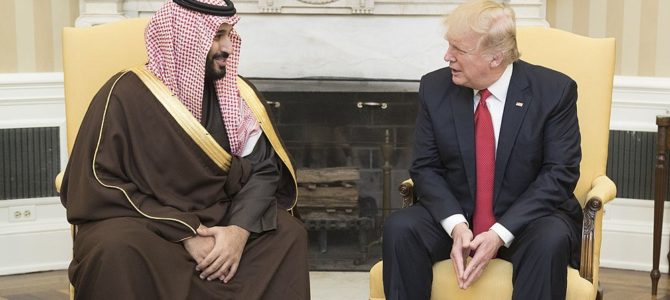In a totally predictable ploy aimed at salvaging the remnants of the Obama foreign policy legacy, the New York Times published a report on Tuesday titled “A Muted Arab Response to Trump’s Mideast Peace Plan.” The caption read, “The U.S. is banking on Arab leaders to help make its plan for ending the Israeli-Palestinian conflict work. It is not clear how realistic that is.”
The feigned skepticism is a masterful stroke the media often employs in order to project disaster upon a given foreign policy maneuver with little to no evidence. It’s what the national security media did vis-à-vis Iran, the Embassy move to Jerusalem, and now, Trump’s peace plan meant to bring to an end the decades-long conflict between Israel and the Palestinians. They are never right, and we should stop listening to them. But just how wrong are they? The Jerusalem Post offered a handy list of those who have echoed support of the new plan.
Let’s start with the Saudis. “In light of the announcement, the Kingdom reiterates its support for all efforts aimed at reaching a just and comprehensive resolution to the Palestinian cause,” the Ministry of Foreign Affairs for the Kingdom of Saudi Arabia wrote on Twitter. As the Crown Prince of Saudi Arabia Mohammad Bin Salman told Palestinian Authority President Mahmoud Abbas, “The establishment of a just and comprehensive peace must be worked for.”
The Egyptians toed a similar line, emphasizing the importance of reaching a peaceful resolution for the sake of regional stability. The Egyptian Ministry of Foreign Affairs released a statement Tuesday applauding the US contribution “to the stability and security of the Middle East, ending the Palestinian-Israeli conflict.”
The statement continued by asking both sides “to undertake a careful and thorough consideration of the US vision to achieve peace and open channels of dialogue, under US auspices; for the resumption of negotiations to present their respective views on reaching an agreement that satisfies the aspirations of both peoples.”
Ambassador of the United Arab Emirates, Yousef Al Otaiba, showed gratitude for American efforts at ensuring long-term peace in the region. “This plan is a serious initiative that addresses many issues raised over the years,” he wrote, adding that it “offers an important starting point for a return to negotiations within a US-led international framework.”
In attendance at the announcement of the plan were not only UAE Ambassador Al Otaiba, but also the ambassadors of Oman and Bahrain, a nod to the countries’ increased support of Israel as of late.
While not every Arab state was on board with Trump’s “Deal of the Century” and some, such as Jordan and Turkey, expressed open displeasure, it’s unquestionable that if Obama were president at the current moment and had managed to get so many Arab states to express public support of such a plan, the media would be falling over themselves to declare Obama the grand peacemaker. The fawning would be endless.
But alas, it is Donald Trump who is seated in the Oval Office, so instead of measured responses, we will likely be subjected to predictions of World War III, followed by lots of hyperbolic adjectives meant to suggest Trump’s foreign policy is the aberration, not Obama’s. This is patently false, however.
With the latest piece in the New York Times, it seems as if national security journalists are just getting warmed up, searching endlessly for way in which to frame this deal so as not to suggest President Obama’s general incompetency. If the deal finds some reasonable success over the coming years, much like the embassy move, it will mean that President Obama’s policy of conceding to Palestinian-Arab terrorists was not actually a sound one, nor one that had any real grounding in reality. It will also mean all the criticisms of Trump’s foreign policy, couched in the skeptical subjunctive, were mostly baseless talking points and the gasping breath of the failed Iran Echo Chamber whose heyday has well passed.









